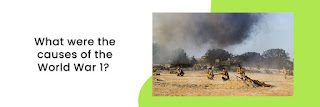Causes of World War 1
There was no single event that precipitated World War I. The conflict was sparked by a series of events that occurred in the years running up to 1914. Some of the events that contributed to the war were as follows:
1. Germany's New International Expansion Policy: In 1890, Wilhelm II, the new German Emperor, launched an international policy aimed at transforming his country into a global force. Germany was viewed as a danger by all other powers, destabilising the international situation.
2. Mutual Defense Alliance: Mutual defence agreements have been signed by countries all throughout Europe. These agreements said that if a country was attacked, the Allies would defend it. At the time, some of the alliances were –
- Germany, Austria-Hungary, and Italy are linked by the Triple Alliance of 1882.
- In 1907, the Triple Entente (Britain, France, and Russia) came to an end.
- As a result, Europe had two rivals.
3. Imperialism: Prior to World War I, sections of Africa and Asia were the subject of raw resource disputes between European governments. Increased competition and a desire for additional empires exacerbated the war, leading to the outbreak of World War I.
4. Militarism: As the world entered the twentieth century, the weapons race began. Germany's military manufacturing had increased by 1914. During this time, both countries built up their warships. This rise in the army aided the warring nations' progress.
5. Nationalism: The conflict began because the Slavic peoples of Bosnia and Herzegovina desired to be a part of Serbia rather than Austria-Hungary. As a result, nationalism became a source of conflict.
6. Archduke Franz Ferdinand's assassination: During a visit to Sarajevo, Bosnia and Herzegovina in June 1914, Archduke Franz Ferdinand, heir to the Austro-Hungarian throne, was shot and killed. He was slain by a Serbian guy who wanted Serbia to dominate Bosnia rather than Austria. As a result, Austria-Hungary invaded Serbia. As a consequence:
- Because of its connection with Serbia, Russia decided to participate.
- Germany declared war on Russia.
- Belgium's Attack is Neutral. The Great Britain declares war on Germany and agrees to defend Belgium and France.
Click to know the consequences of world war 1 and the Effects of World War I on Germany
Tag - causes of world war 1 summary; causes of world war 1 class 9; world war 1 summary; History notes for class 9; NCERT Class 9

Comments
Post a Comment
Thank you we will contact ASAP.